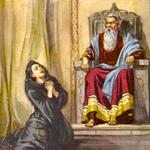Catholic Dictionary
Find accurate definitions of over 5,000 Catholic terms and phrases (including abbreviations). Based on Fr. John Hardon's Modern Catholic Dictionary, © Eternal Life. Used with permission.
Random Term from the Dictionary:
PAUL
The most dynamic of Christ's apostles, even though he was not one of the original twelve. His name was Saul, changed to Paul after his conversion. He was a Jew, born in Tarsus of Cilicia and his family were Pharisees (Acts 22:3). Saul became a leader among the fanatical Pharisees and developed a reputation for ferocious enmity toward Christians (Acts 8:3). He was traveling on the road to Damascus (on an anti-Christian mission) when he was thrown to the ground and blinded by a dazzling light. Christ appeared to him and he was instantly converted. "What am I to do, Lord?" he asked (Acts 22:10). He spent a number of years in Arabia (Galatians 1:17). His status when he began to preach Christianity was awkward; the Pharisees considered him a turncoat; the Christians feared him because of his early reputation. Barnabas was especially helpful to him at this stage; he introduced him to Christian groups and vouched for his sincerity in both Antioch and Jerusalem (Acts 9:27). This association was so effective that the Church in Antioch commissioned Barnabas, as leader, and Paul and Mark as assistants to take a missionary voyage through Cyprus, Pamphylia, Iconium, Lystra, and Derbe (Acts 13, 14). This led to a dramatic confrontation. Paul, Barnabas, and Titus proceeded to Jerusalem to urge a more flexible concept of a Christian than that of a circumcised Old Law Jew (Galatians 2). Peter presided. After all viewpoints were presented, Paul's own group won the day: Gentiles did not have to become Jews to become Christians (Acts 15:5-21). Then began Paul's second missionary journey. This time the journey took Paul through Phrygia, Galatia, Philippi, Thessalonica, and Beroea (Acts 18:23). Some of these visits were the first ventures into Europe of Christian apostles. There followed a third journey, through Macedonia and Greece. Only the wariness of his followers saved him from injury or death on several occasions (Acts 19:30). Especially venomous were the Jews in Jerusalem; his Roman citizenship saved his life several times. Some of his finest epistles were written during a two-year period while he was under house arrest awaiting trial. Death came to him finally in Rome during Nero's persecution by decapitation in about 67. He is buried near the present Basilica of St. Paul. (Etym. Latin Paul[l]us.)






